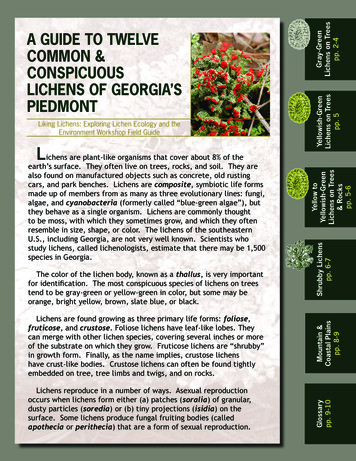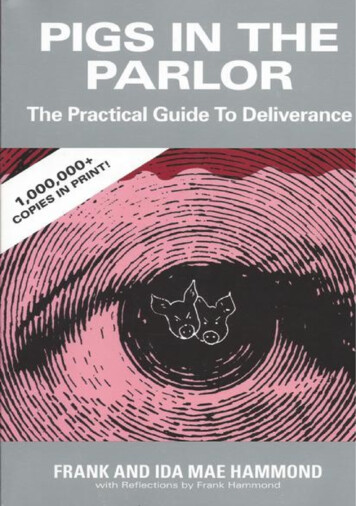
Transcription
The Picture of DorianGrayOscar WildeThis eBook was designed and published by Planet PDF. To hearabout our latest releases subscribe to the Planet PDF Newsletter.
The Picture of Dorian GrayChapter IThe studio was filled with the rich odor of roses, andwhen the light summer wind stirred amidst the trees of thegarden there came through the open door the heavy scentof the lilac, or the more delicate perfume of the pinkflowering thorn.From the corner of the divan of Persian saddle-bags onwhich he was lying, smoking, as usual, innumerablecigarettes, Lord Henry Wotton could just catch the gleamof the honey-sweet and honey-colored blossoms of thelaburnum, whose tremulous branches seemed hardly ableto bear the burden of a beauty so flame-like as theirs; andnow and then the fantastic shadows of birds in flight flittedacross the long tussore-silk curtains that were stretched infront of the huge window, producing a kind ofmomentary Japanese effect, and making him think of thosepallid jade-faced painters who, in an art that is necessarilyimmobile, seek to convey the sense of swiftness andmotion. The sullen murmur of the bees shouldering theirway through the long unmown grass, or circling withmonotonous insistence round the black-crocketed spires ofthe early June hollyhocks, seemed to make the stillness2 of 250
The Picture of Dorian Graymore oppressive, and the dim roar of London was like thebourdon note of a distant organ.In the centre of the room, clamped to an upright easel,stood the full-length portrait of a young man ofextraordinary personal beauty, and in front of it, somelittle distance away, was sitting the artist himself, BasilHallward, whose sudden disappearance some years agocaused, at the time, such public excitement, and gave riseto so many strange conjectures.As he looked at the gracious and comely form he hadso skilfully mirrored in his art, a smile of pleasure passedacross his face, and seemed about to linger there. But hesuddenly started up, and, closing his eyes, placed hisfingers upon the lids, as though he sought to imprisonwithin his brain some curious dream from which he fearedhe might awake.‘It is your best work, Basil, the best thing you haveever done,’ said Lord Henry, languidly. ‘You mustcertainly send it next year to the Grosvenor. TheAcademy is too large and too vulgar. The Grosvenor is theonly place.’‘I don’t think I will send it anywhere,’ he answered,tossing his head back in that odd way that used to make3 of 250
The Picture of Dorian Grayhis friends laugh at him at Oxford. ‘No: I won’t send itanywhere.’Lord Henry elevated his eyebrows, and looked at himin amazement through the thin blue wreaths of smoke thatcurled up in such fanciful whorls from his heavy opiumtainted cigarette. ‘Not send it anywhere? My dear fellow,why? Have you any reason? What odd chaps you paintersare! You do anything in the world to gain a reputation. Assoon as you have one, you seem to want to throw it away.It is silly of you, for there is only one thing in the worldworse than being talked about, and that is not being talkedabout. A portrait like this would set you far above all theyoung men in England, and make the old men quitejealous, if old men are ever capable of any emotion.’‘I know you will laugh at me,’ he replied, ‘but I reallycan’t exhibit it. I have put too much of myself into it.’Lord Henry stretched his long legs out on the divanand shook with laughter.‘Yes, I knew you would laugh; but it is quite true, allthe same.’‘Too much of yourself in it! Upon my word, Basil, Ididn’t know you were so vain; and I really can’t see anyresemblance between you, with your rugged strong faceand your coal-black hair, and this young Adonis, who4 of 250
The Picture of Dorian Graylooks as if he was made of ivory and rose-leaves. Why, mydear Basil, he is a Narcissus, and you—well, of course youhave an intellectual expression, and all that. But beauty,real beauty, ends where an intellectual expression begins.Intellect is in itself an exaggeration, and destroys theharmony of any face. The moment one sits down to think,one becomes all nose, or all forehead, or somethinghorrid. Look at the successful men in any of the learnedprofessions. How perfectly hideous they are! Except, ofcourse, in the Church. But then in the Church they don’tthink. A bishop keeps on saying at the age of eighty whathe was told to say when he was a boy of eighteen, andconsequently he always looks absolutely delightful. Yourmysterious young friend, whose name you have never toldme, but whose picture really fascinates me, never thinks. Ifeel quite sure of that. He is a brainless, beautiful thing,who should be always here in winter when we have noflowers to look at, and always here in summer when wewant something to chill our intelligence. Don’t flatteryourself, Basil: you are not in the least like him.’‘You don’t understand me, Harry. Of course I am notlike him. I know that perfectly well. Indeed, I should besorry to look like him. You shrug your shoulders? I amtelling you the truth. There is a fatality about all physical5 of 250
The Picture of Dorian Grayand intellectual distinction, the sort of fatality that seems todog through history the faltering steps of kings. It is betternot to be different from one’s fellows. The ugly and thestupid have the best of it in this world. They can sitquietly and gape at the play. If they know nothing ofvictory, they are at least spared the knowledge of defeat.They live as we all should live, undisturbed, indifferent,and without disquiet. They neither bring ruin upon othersnor ever receive it from alien hands. Your rank andwealth, Harry; my brains, such as they are,—my fame,whatever it may be worth; Dorian Gray’s good looks,—we will all suffer for what the gods have given us, sufferterribly.’‘Dorian Gray? is that his name?’ said Lord Henry,walking across the studio towards Basil Hallward.‘Yes; that is his name. I didn’t intend to tell it to you.’‘But why not?’‘Oh, I can’t explain. When I like people immensely Inever tell their names to any one. It seems likesurrendering a part of them. You know how I lovesecrecy. It is the only thing that can make modern lifewonderful or mysterious to us. The commonest thing isdelightful if one only hides it. When I leave town I nevertell my people where I am going. If I did, I would lose all6 of 250
The Picture of Dorian Graymy pleasure. It is a silly habit, I dare say, but somehow itseems to bring a great deal of romance into one’s life. Isuppose you think me awfully foolish about it?’‘Not at all,’ answered Lord Henry, laying his handupon his shoulder; ‘not at all, my dear Basil. You seem toforget that I am married, and the one charm of marriage isthat it makes a life of deception necessary for both parties.I never know where my wife is, and my wife never knowswhat I am doing. When we meet,—we do meetoccasionally, when we dine out together, or go down tothe duke’s,— we tell each other the most absurd storieswith the most serious faces. My wife is very good at it,—much better, in fact, than I am. She never gets confusedover her dates, and I always do. But when she does findme out, she makes no row at all. I sometimes wish shewould; but she merely laughs at me.’‘I hate the way you talk about your married life,Harry,’ said Basil Hallward, shaking his hand off, andstrolling towards the door that led into the garden. ‘Ibelieve that you are really a very good husband, but thatyou are thoroughly ashamed of your own virtues. You arean extraordinary fellow. You never say a moral thing, andyou never do a wrong thing. Your cynicism is simply apose.’7 of 250
The Picture of Dorian Gray‘Being natural is simply a pose, and the most irritatingpose I know,’ cried Lord Henry, laughing; and the twoyoung men went out into the garden together, and for atime they did not speak.After a long pause Lord Henry pulled out his watch. ‘Iam afraid I must be going, Basil,’ he murmured, ‘andbefore I go I insist on your answering a question I put toyou some time ago.’‘What is that?’ asked Basil Hallward, keeping his eyesfixed on the ground.‘You know quite well.’‘I do not, Harry.’‘Well, I will tell you what it is.’‘Please don’t.’‘I must. I want you to explain to me why you won’texhibit Dorian Gray’s picture. I want the real reason.’‘I told you the real reason.’‘No, you did not. You said it was because there wastoo much of yourself in it. Now, that is childish.’‘Harry,’ said Basil Hallward, looking him straight in theface, ‘every portrait that is painted with feeling is a portraitof the artist, not of the sitter. The sitter is merely theaccident, the occasion. It is not he who is revealed by thepainter; it is rather the painter who, on the colored canvas,8 of 250
The Picture of Dorian Grayreveals himself. The reason I will not exhibit this picture isthat I am afraid that I have shown with it the secret of myown soul.’Lord Harry laughed. ‘And what is that?’ he asked.‘I will tell you,’ said Hallward; and an expression ofperplexity came over his face.‘I am all expectation, Basil,’ murmured his companion,looking at him.‘Oh, there is really very little to tell, Harry,’ answeredthe young painter; ‘and I am afraid you will hardlyunderstand it. Perhaps you will hardly believe it.’Lord Henry smiled, and, leaning down, plucked apink-petalled daisy from the grass, and examined it. ‘I amquite sure I shall understand it,’ he replied, gazing intentlyat the little golden white-feathered disk, ‘and I can believeanything, provided that it is incredible.’The wind shook some blossoms from the trees, and theheavy lilac blooms, with their clustering stars, moved toand fro in the languid air. A grasshopper began to chirrupin the grass, and a long thin dragon-fly floated by on itsbrown gauze wings. Lord Henry felt as if he could hearBasil Hallward’s heart beating, and he wondered what wascoming.9 of 250
The Picture of Dorian Gray‘Well, this is incredible,’ repeated Hallward, ratherbitterly,— ‘incredible to me at times. I don’t know what itmeans. The story is simply this. Two months ago I wentto a crush at Lady Brandon’s. You know we poor paintershave to show ourselves in society from time to time, justto remind the public that we are not savages. With anevening coat and a white tie, as you told me once,anybody, even a stock-broker, can gain a reputation forbeing civilized. Well, after I had been in the room aboutten minutes, talking to huge overdressed dowagers andtedious Academicians, I suddenly became conscious thatsome one was looking at me. I turned half-way round,and saw Dorian Gray for the first time. When our eyesmet, I felt that I was growing pale. A curious instinct ofterror came over me. I knew that I had come face to facewith some one whose mere personality was so fascinatingthat, if I allowed it to do so, it would absorb my wholenature, my whole soul, my very art itself. I did not wantany external influence in my life. You know yourself,Harry, how independent I am by nature. My fatherdestined me for the army. I insisted on going to Oxford.Then he made me enter my name at the Middle Temple.Before I had eaten half a dozen dinners I gave up the Bar,and announced my intention of becoming a painter. I10 of 250
The Picture of Dorian Grayhave always been my own master; had at least always beenso, till I met Dorian Gray. Then—But I don’t know howto explain it to you. Something seemed to tell me that Iwas on the verge of a terrible crisis in my life. I had astrange feeling that Fate had in store for me exquisite joysand exquisite sorrows. I knew that if I spoke to Dorian Iwould become absolutely devoted to him, and that Iought not to speak to him. I grew afraid, and turned toquit the room. It was not conscience that made me do so:it was cowardice. I take no credit to myself for trying toescape.’‘Conscience and cowardice are really the same things,Basil. Conscience is the trade-name of the firm. That isall.’‘I don’t believe that, Harry. However, whatever wasmy motive,— and it may have been pride, for I used to bevery proud,—I certainly struggled to the door. There, ofcourse, I stumbled against Lady Brandon. ‘You are notgoing to run away so soon, Mr. Hallward?’ she screamedout. You know her shrill horrid voice?’‘Yes; she is a peacock in everything but beauty,’ saidLord Henry, pulling the daisy to bits with his long,nervous fingers.11 of 250
The Picture of Dorian Gray‘I could not get rid of her. She brought me up toRoyalties, and people with Stars and Garters, and elderlyladies with gigantic tiaras and hooked noses. She spoke ofme as her dearest friend. I had only met her once before,but she took it into her head to lionize me. I believe somepicture of mine had made a great success at the time, atleast had been chattered about in the penny newspapers,which is the nineteenth-century standard of immortality.Suddenly I found myself face to face with the young manwhose personality had so strangely stirred me. We werequite close, almost touching. Our eyes met again. It wasmad of me, but I asked Lady Brandon to introduce me tohim. Perhaps it was not so mad, after all. It was simplyinevitable. We would have spoken to each other withoutany introduction. I am sure of that. Dorian told me soafterwards. He, too, felt that we were destined to knoweach other.’‘And how did Lady Brandon describe this wonderfulyoung man? I know she goes in for giving a rapid précis ofall her guests. I remember her bringing me up to a mosttruculent and red-faced old gentleman covered all overwith orders and ribbons, and hissing into my ear, in atragic whisper which must have been perfectly audible toeverybody in the room, something like ‘Sir Humpty12 of 250
The Picture of Dorian rigues: very successful man—wife killed by anelephant—quite inconsolable—wants to marry a beautifulAmerican widow—everybody does nowadays—hates Mr.Gladstone



